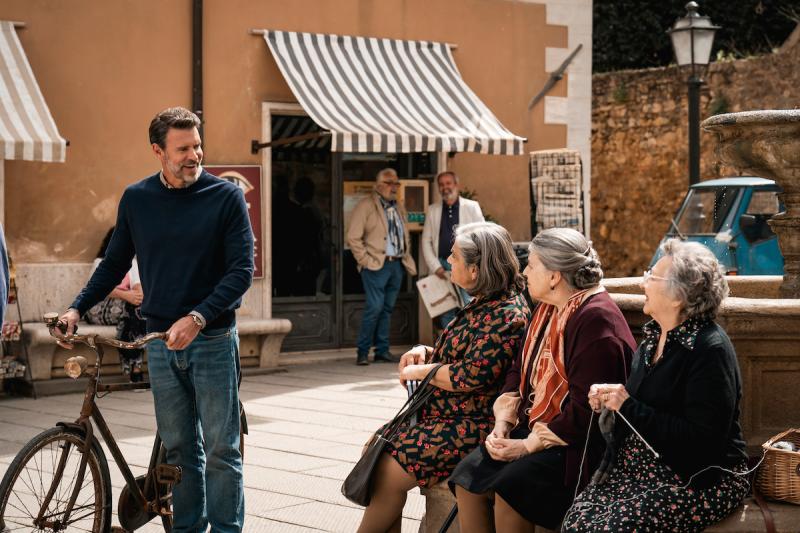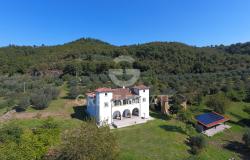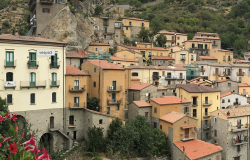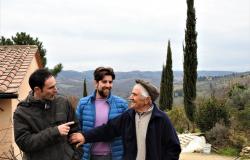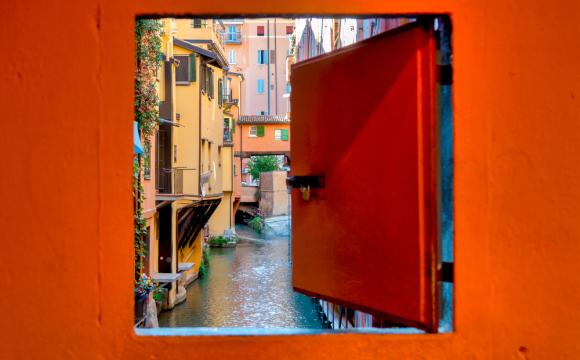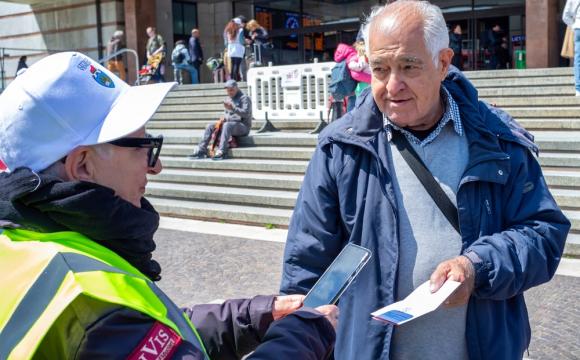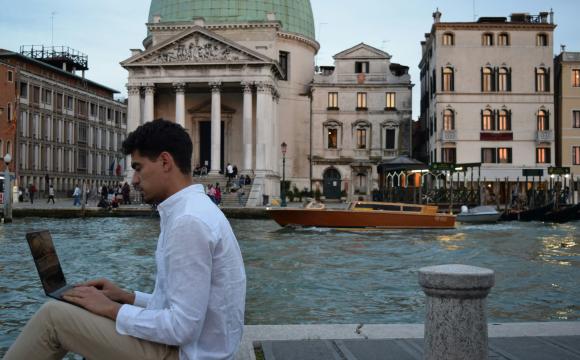If you’re looking for a feel-good rom-com set in Tuscany, I might suggest sticking with the classics rather than straining your way through Netflix’s La Dolce Villa.
Released just ahead of Valentine’s Day, the obvious knockoff of 2003’s Under the Tuscan Sun tells the story of 20-something Olivia Field (Maia Reficco) and her hottie father Eric (Scott Foley) who find themselves sparring over her decision to purchase and renovate one of Italy’s infamous one euro homes. Dad is convinced the dubious dime-store domicile Olivia’s interested in is a scam — that is, until he meets Francesca (Violante Placido), the pretty mayor of the fictional town of Montezara.
The film’s tagline, “He went to rescue his daughter, but Italy had other plans” foreshadows the film’s storyline and familiar ending: Come to Italy, buy and fix up a ramshackle property, fall in love, and live happily ever after.
Look, I love a fun, escapist film set in Italy as much as the next gal. Some of my all-time favorites include Enchanted April (1991), a period romp about a group of Londoners who let a house on an Italian island; Liv Tyler’s and Jeremy Irons’ shared 1996 turn in Stealing Beauty; the sentimental My House in Umbria (2003) starring the Dowager Countess of Grantham herself, Dame Maggie Smith; and the aforementioned smash hit with Diane Lane, based on the memoir of American writer Frances Mayes.
But even for me, La Dolce Villa was such a full-on cringe-watch that I only managed to finish because of this assignment.
Admittedly, there are some pros. (Scott Foley has aged well!). Director Mark Waters (whose other credits include Mean Girls, Freaky Friday and Bad Santa 2) filmed on location in and around eastern Lazio as well as in the Tuscan towns of San Quirico d’Orcia, Pienza and Montepulciano — all with stunning results. The cinematography is postcard-perfect, and puts Italy’s photogenic qualities on glorious display. But… that’s pretty much the only thing it gets right about life in small-town Italy. Here’s what it gets wrong.
(Warning: Some spoilers are ahead, but there’s nothing here you wouldn’t be able to predict yourself just by watching the trailer.)
Everyone in town immediately rolls out the red carpet for Eric.
Eric behaves like your stereotypical wide-eyed American in Italy: A former chef, he teaches restaurant owner Giovanni how to make his daughter’s favorite Italian dish from childhood (wait for it: fettuccine alfredo). He commits the cardinal sin of heating up frozen dinners in the microwave and sets up a whiteboard to track the renovation schedule — much to the mayor’s delight. (She claims to be a workaholic like Eric, but is rarely seen at her desk or out performing official duties.)
There’s nothing wrong with Eric’s naïveté per se, but none of his bumbling is ever met with the slightest resistance or skepticism from the local community. Even the famously glossy film version of Under the Tuscan Sun depicts the integration process more accurately than La Dolce Villa: It took time for people to accept Diane Lane’s character as the foreign newcomer, just as it did in my own experience. “Winning over” some shopkeepers and other folks in my community was, for me, a years-long process. For Eric, all conflicts get resolved with a neat, sugary sweet little one-liner. Then everyone moves on.
50-something Eric achieves rapid Italian fluency just by listening to lessons on tape — in a town where everyone speaks flawless English.
Committed as he is to immersing himself in the culture and traditions of his adoptive home, Eric listens to Italian language lessons while riding his bike through the countryside, helping him reach relative fluency in a few short months (just like Julia Roberts’ character did in Eat, Pray, Love). But of course, the entire population of Montezara already speaks Cambridge-quality English (just like everyone does in every small town in Italy, amiright?), so there was no real need for those audio lessons in the first place.
The romantic entanglements are…questionable.
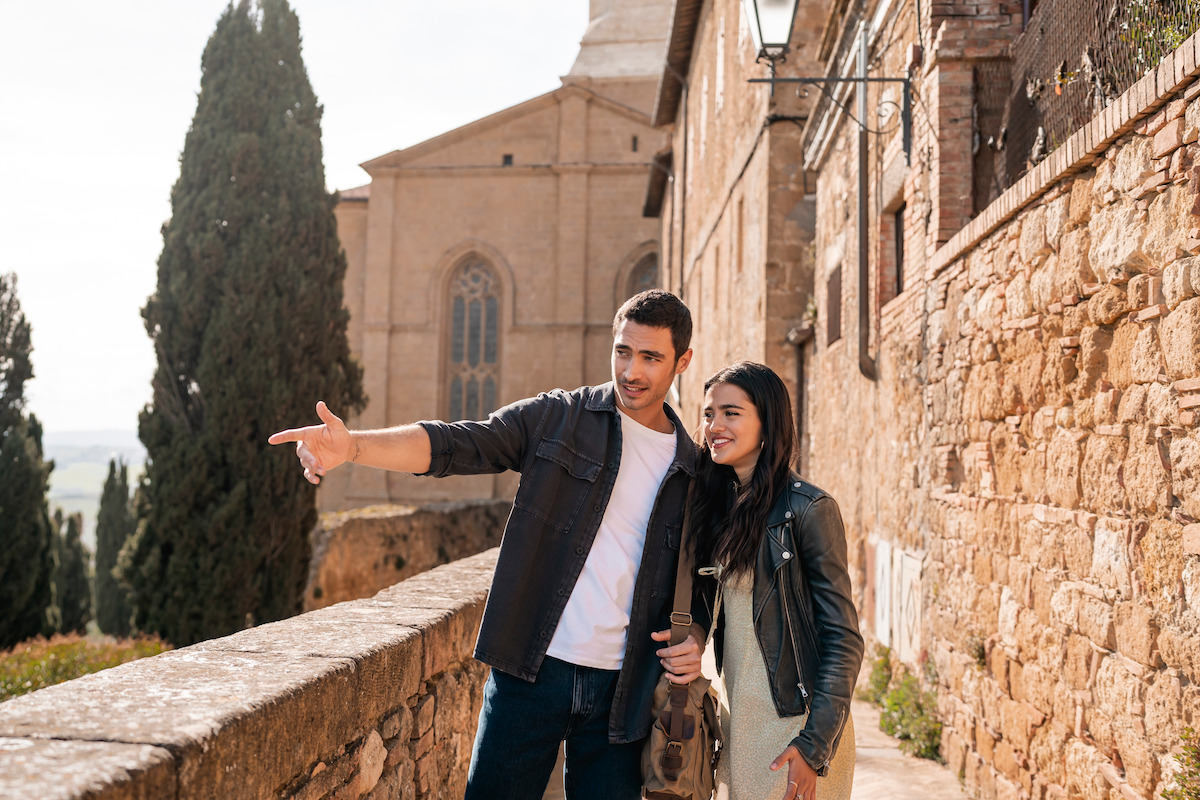
In matters of the heart, we see young Giovanni start out as a pesky flirt who annoys Olivia. At breakneck speed, however, they get together — proving, of course, that Italian men are uniformly irresistible (would you expect anything less from this film genre?). A bit more disturbingly, young couple Cesare and Donata, who work at a local bar, engage regularly in glass-shattering outbursts, breaking up and getting back together every other day. Eric — relationship expert that he is — advises Cesare that Donata is “worth fighting for.” Because nothing says amore like a domestic violence situation. Uffa.
The caricatured Italians are all flatter than Roman-style pizza.
You probably knew this was coming. There’s the case of the three Antonias — a trio of elderly ladies (dubbed “nonne influencers”) who spend all day, every day sitting by the fountain in the town’s main piazza, practicing the art of dolce far niente (the sweetness of doing nothing). Nothing except, well, hitting the bottle: “Left (Bossy) Antonia” (that’s how her character is listed on IMDb) hides an emergency flask in her bag, while the mayor’s inept assistant asks if a shot of grappa is warranted in nearly every situation. It’s likely that in the real-life version of this renovation story, the stressy Americans would be doing much more of the drinking.
The properties and timelines are so far off base it’s laughable.
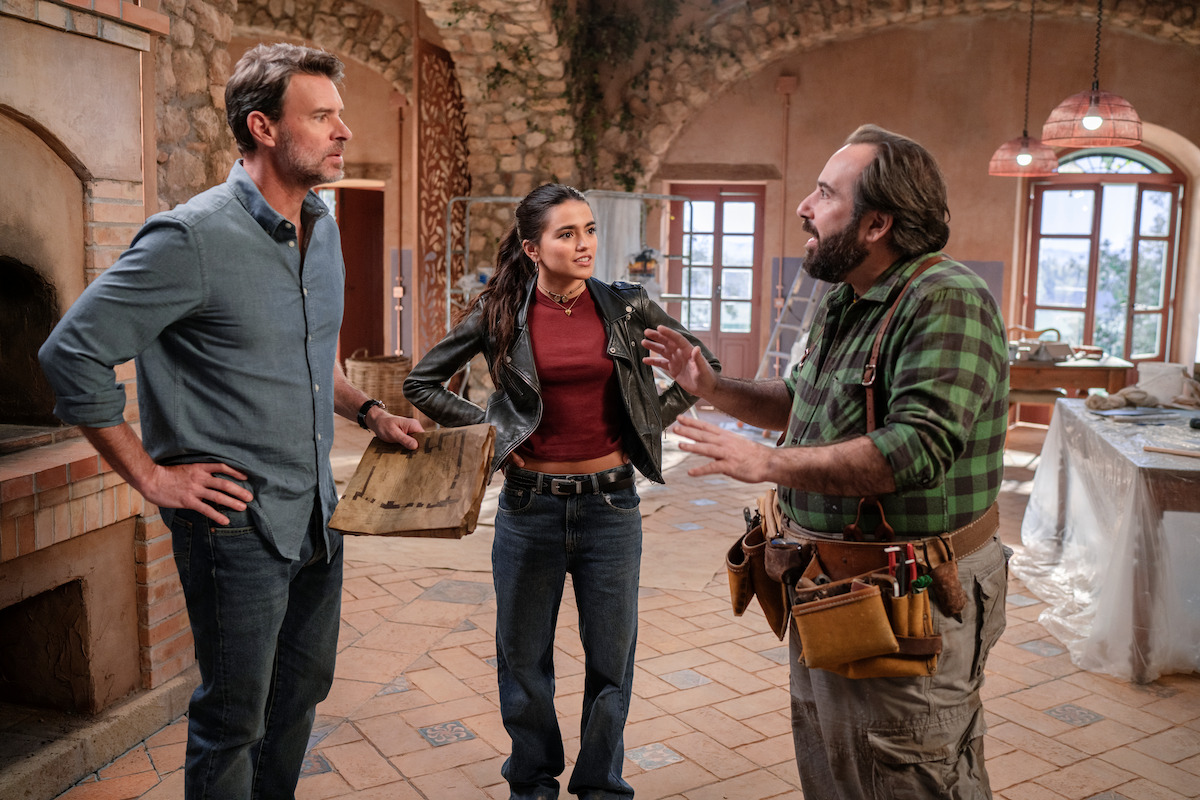
Look, I get it — the movie is pure Italian fantasy fodder, barely over 90 minutes long, with a lot to squeeze in. But if La Dolce Villa resembled anything close to reality, those 97 minutes would focus purely on the logistics of the one-euro home sale.
As the film opens, we see Eric frantically arriving in Montezara to save his daughter from impending financial disaster. Despite his apprehension, he agrees to accompany Olivia and Sindaca Francesca on a tour of the town’s numerous one-euro houses on offer. They’re all dumps, of course (“What do you expect for one euro, the Sistine Chapel?” quips Francesca).
When Olivia balks at the sorry selection, the mayor offers her a gigantic property “not yet approved” for the program. The impetuous young woman agrees to purchase the one-buck wonder on the spot, and she and Dad move in that very night (because miraculously there’s electricity, running water, heat, bed linens, and even a microwave — which, naturally, Eric will put to good use). The next day il geometra (the surveyor) Bernardo waives the six-month waiting period for permits and the renovations begin immediately. No delays. No contracts. Nessun problema.
“That’s total BS,” says Rebecca Hawkins, an American mother of two from Chicago who bought a home with her husband in the historic center of Orvieto in 2022. “We first viewed the house in January [of that year], put in an offer in that same week, made a counter offer the next, and closed on the property on April 6, which according to our Italian friends, was amazingly fast.” After finding a contractor they liked and trusted, renovations began in August 2023. As of 2025, the family is still unable to move into the house.
“We had to obtain permits to repair the roof, then wait nearly three weeks just for permission to have the ceiling beams delivered up our steep, narrow street,” Hawkins says.
The experience has been mostly positive and Hawkins has no regrets. But she agrees that seeing others “misrepresent how things really are, trying to sell an Italy that doesn’t exist” can be tiresome. “We love the slow and peaceful lifestyle Italy affords,” Hawkins clarifies, “but let’s face it, renovating a house here is not for the faint of heart [...] It’s not all sunsets and spritzes.”
La Dolce Villa verdict
I personally found La Dolce Villa’s plotline painfully predictable, the dialogue dull, and the characters, even in their rare moments of charm, as 2D as they come. But there’s no doubt that plenty of viewers will want to watch it (and already have) for precisely those reasons. Variety reported after Valentine’s Day weekend that with 19.8 million views, the film was Netflix’s most-watched title between February 10 and 16, even though it was only online for four days in that window.
I’m not surprised. After all, rom-coms are meant to transport us to a place where we believe in the power of love and possibility. Certainly, you can find both of those things in Italy — but with bumps in the road that Eric and Olivia would probably trip right over.
